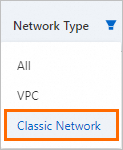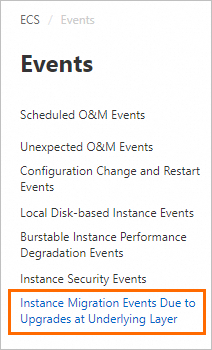Alibaba Cloud announces that Elastic Compute Service (ECS) instances in the classic network will reach end of life (EOL) on February 28, 2025. If you have ECS instances that are deployed in the classic network, we recommend that you migrate the instances to virtual private clouds (VPCs) at the earliest opportunity to prevent instance resources from being released and ensure business continuity.
The EOL will affect ECS instances that are deployed in the classic network but not ECS instances that are deployed in VPCs.
Background
Since the Alibaba Cloud public cloud was released in 2011, the classic network architecture is used to host ECS instances and serve numerous users in the cloud. In 2014, Alibaba Cloud released VPC-based cloud services, which are more secure, consistent, flexible, and performant than classic network-based cloud services. After years, the VPC network architecture increasingly became the default choice of Alibaba Cloud users. Against this backdrop, Alibaba Cloud starts the EOL process for ECS instances in the classic network.
To help minimize the impacts on your workloads, Alibaba Cloud provides sufficient time prior to the EOL dates to allow you to devise, test, and execute plan for migrating ECS instances from the classic network to VPCs. Alibaba Cloud provides necessary migration tools, help documents, and technical support to assist in your migration.
Dates and impacts
Region | Date | Impact |
All regions | 00:00:00 on July 25, 2024 (UTC+8): start date of limited renewal and subscription | Starting July 17, 2024, you can renew existing ECS instances in the classic network to up to February 27, 2025. The subscription periods of new ECS instances in the classic network cannot be longer than six months. If you want to renew your ECS instances in the classic network for a longer period of time, migrate the instances to VPCs. |
00:00:00 on August 27, 2024 (UTC+8): start date of limited sales | Subscription ECS instances in the classic network will reach end of sale (EOS) on August 20, 2024. You can purchase ECS instances in VPCs or pay-as-you-go or spot instances in the classic network. | |
00:00:00 on September 24, 2024 (UTC+8): EOS date | ECS instances, including pay-as-you-go and spot instances, that are deployed in the classic network will reach EOS on September 24, 2024. No Alibaba Cloud accounts can create cloud resources in the classic network. | |
00:00:00 on October 30, 2024 (UTC+8): End-of-renewal date | Starting October 30, 2024, you cannot renew ECS instances in the classic network. | |
00:00:00 on February 28, 2025 (UTC+8): EOL date | Alibaba Cloud will stop providing services related to ECS instances in the classic network. If you do not proactively migrate your classic network instances:
|
EOL option
Step 1: Query ECS instances that are deployed in the classic network
Starting from August 1, 2024 (UTC+8), Alibaba Cloud sends Instance Migration Events Due to Upgrades at Underlying Layer. After August 1, 2024 (UTC+8), if you do not receive notifications about the events, you can use Method 1 or 2 to query the events.
Method 1: Use the ECS console
Log on to the ECS console.
In the left-side navigation pane, choose .
In the top navigation bar, select the region and resource group of the resource that you want to manage.

On the Instance page, click the Filter icon at the top of the Network Type column and select Classic Network from the drop-down list to obtain the list of ECS instances that are deployed in the classic network in the current region.
NoteQuery the ECS instances that are deployed in the classic network in each region.

Method 2: Call an ECS API operation
Log on to the OpenAPI Portal and find the DescribeInstances operation on the Debugging page.
Specify request parameters to call the DescribeInstances operation to query the ECS instances that are deployed in the classic network in a specific region. The following table describes the parameters.
NoteQuery the ECS instances that are deployed in the classic network in each region.
Parameter
Description
Example
RegionId
The region ID of the ECS instance. You can call the DescribeRegions operation to query the most recent region list.
cn-hangzhou
InstanceNetworkType
The network type of the ECS instance. Valid values:
classic: classic network.
vpc: VPC.
classic
Method 3: View events
Log on to the ECS console.
In the left-side navigation pane, click Events.
On the Events page, click the Instance Migration Events Due to Upgrades at Underlying Layer tab to view all ECS instances in the classic network that need to be migrated.
If a specific number of events need to be handled, the number is displayed on the Instance Migration Events Due to Upgrades at Underlying Layer tab, as shown in the following figure.

The following table describes the events on the Instance Migration Events Due to Upgrades at Underlying Layer tab.
Event code | Event name | Event level | CloudMonitor event name | Event description and impact | Handling suggestion |
SystemUpgrade.Migrate | Instance Migration Events Due to Upgrades at Underlying Layer | Critical | Undefined | This system event is triggered when ECS instances are affected by the upgrades and improvements of physical infrastructure in regions and zones where the instances reside. | We recommend that you view the event details in the ECS console and migrate the affected instances as prompted. For information about how to migrate the affected instances, see the Step 2: Migrate ECS instances from the classic network to a VPC section of this topic. |
Step 2: Migrate ECS instances from the classic network to a VPC
To prevent your business from being affected, we recommend that you migrate ECS instances from the classic network to VPCs. You are not charged additional fees for the migration. Compared with ECS instances in the classic network, ECS instances in VPCs are more secure, support more features and instance types, and are more flexible to use in cloud computing scenarios.
Scenario | Recommended migration solution and consideration |
ECS instances are deployed in the classic network. |
|
Other cloud resources, such as ApsaraDB RDS instances or ApsaraDB for Redis instances, are deployed in the classic network. | ECS instances deployed in VPCs cannot connect to RDS instances deployed in the classic network over the internal network. To resolve this issue, you must change the network type of the RDS instances from the classic network to VPC and enable the hybrid access mode. For more information, see Best practices for migrating all instances from the classic network to a VPC and Hybrid access to ApsaraDB services. |
ECS instances that are deployed in the classic network use images of earlier versions, such as Windows Server 2003 and earlier and CentOS 5.8 and earlier. | After you migrate ECS instances that use images of earlier versions from the classic network to a VPC, you may encounter issues, such as kernel panic failures, blue-screen errors, and INACCESSIBLE_BOOT_DEVICE errors. For information about how to resolve the preceding issues, see How do I resolve downtime issues that occur on migrated instances? |
For more information, see Events related to instance migration due to upgrades at the underlying layer.